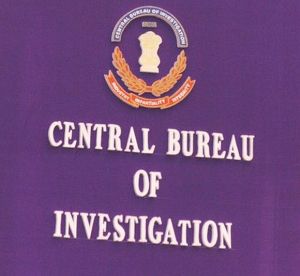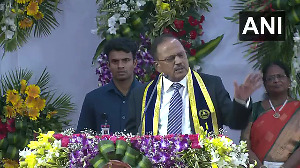
The Central Bureau of Investigation on Tuesday told the Supreme Court that its director should be given a minimum three-year term instead of two with a rank equal to a secretary and sought more financial autonomy while rejecting Centre's proposal for an accountability panel for it.
Contending that administrative and financial powers of the CBI director are "limited", the agency in its 14-page affidavit said more is needed to be done than what has been proposed by the Centre to ensure autonomy and insulate it from extraneous influences.
The agency submitted that its director be vested with ex-officio powers of secretary for reporting directly to the minister without having to go through the Department of Personnel and Training.
It opposed Centre's move to set up an accountability commission to inquire into allegations of misbehaviour, impropriety or irregularities of its officials.
In its response to Centre's proposal on the autonomy issue, the CBI stressed that minimum tenure for its director should be three years against two years proposed by the government and said that more power be given to him to make the agency "discharge its core function without fear or favour".
"In the present arrangement, administrative, disciplinary and financial powers of the Director are limited and this impinges on his ability to ensure expeditious and compete investigation and high ethical standard among his subordinates.
"As such, it is necessary that the director should be vested with ex-officio powers of secretary of Government of India reporting directly to the Minister without having to go through the DoPT. This will also mean that the budget for the CBI may be separately put up through Minister to the Department of Expenditure," the affidavit said.
The agency said that under this system the director would be independent of the ministry as far as investigation is concerned and would continue to be accountable to the minister for administrative and financial matters.
"A director who is free to take routine administrative and financial decisions within prescribed rules is necessary for the CBI to remain insulated to discharge its core function without fear or favour," the agency said.
"It needs to reiterated that administrative and financial powers are essential for the efficiency of CBI and for insulating it from Ministry in its day to day functioning. A director who is dependent on ministry for routine administrative and financial approvals is not best placed to take independent and objective decision in crunch situation," it said.
CBI said there is an internal mechanism to deal with its errant officers and turned down Centre's proposal to set up accountability commission saying that it would create an "anomalous situation".
"CBI is of the view that creation of an outside accountability commission will have the tendency of compromising discipline within the organisation as disciplinary power will vest outside, albeit indirectly. This will create an anomalous situation," it said.
Besides, such a provision will disturb the chain of command within the organisation and this will undermine the position of director and other senior officials in the organisation, it argued.
It said that the view of outgoing director be also considered while appointment of a new director.
"CBI is of the view that a period of two years will be too short for the director to have a long term perspective of the organisation. It needs to be made a minimum three years," it said.
Interestingly, the agency agreed with Centre's proposal that the government will have the power of superintendence and administration over the CBI for all cases except those which come under the Prevention of Corruption(PC) Act. CVC will have such power over the CBI for all cases to be probed under the PC Act.
The affidavit also said that CBI Director be given power to induct SP level officers. At present, he has powers to induct only up to Inspector-level officers.
"CBI is of the view that experience shows that vacancies at the cutting edge level at the rank of SP remain very high. In view of the continued large number of vacancies at SP level and delay in the entire process of induction, the director may be empowered to induct SP level officers subject to the officers being available on the offer list for Central Deputation," it said.
The agency agreed with the government recommendation that the CBI would have power to go ahead with prosecution for its officials if the Centre does not grant sanction within three months but it said "An exception is required to be made to obviate the need of the consent of the state government in the matters pertaining to employees of Central government and PSUs working in the state".
The Centre had earlier told the Supreme Court that it was bringing significant changes in laws to free CBI from extraneous influences and usher in a new system of appointing its Director providing a say for apex judiciary and Leader of the Opposition while making his removal tougher.
Asked to put in place a law for ensuring independence of and functional autonomy of CBI, the Centre had filed a 41-page affidavit in the apex court detailing the various steps it was planning to insulate the agency from political and other influences.
The government had said that Delhi Special Police Establishment Act, under whose provisions the CBI operates, would be amended to provide for a Committee under the aegis of Prime Minister, including the Chief Justice of India or a Supreme Court Judge and the Leader of Opposition in Lok Sabha, that will choose the Director.
At present, the Director is appointed by the Centre from a panel of officers recommended by a committee comprising of Central Vigilance Commissioner (Chairperson), Vigilance Commissioners, Secretary in-charge of Home Ministry and Secretary (Co-ordination and Public Grievances) Cabinet Secretariat.
The affidavit said that CVC will have the power of superintendence and administration over the CBI for all cases to be probed under the Prevention of Corruption Act but such power would vest in the Centre for rest of the cases.
The affidavit was filed in compliance with apex court's May 8 order asking the government as to whether it intended to put in place a law to ensure independence of CBI and its functional autonomy and insulate it from extraneous influences of any kind.
Dubbing the agency as a "caged parrot", the court had passed the order in the wake of sensational disclosure made by the CBI director Ranjit Sinha that the agency shared its Coalgate investigation report with the then Law Minister Ashwani Kumar and top officials of the PMO and Coal Ministry as desired by them.











